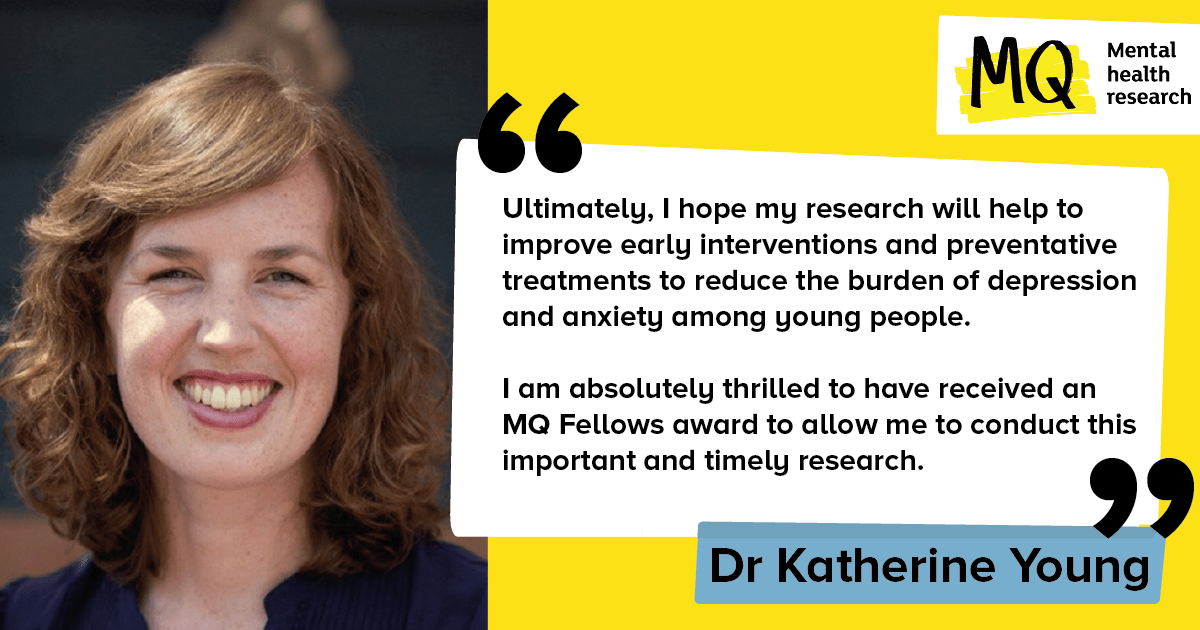Meet Dr Katie Young. She is one of three of our newest MQ Fellows. Her new research will look at depression and anxiety in young people, within the context of the COVID-19 pandemic and beyond.
Could you tell us about your academic career to date?
After completing my undergraduate degree in psychology and neuroscience at the University of Oxford, I took a few years out to work for a charity for young people with disabilities and to gain research experience in mental health. I went on to complete my PhD at Oxford focusing on the neuroscience of postnatal depression before moving to the University of California, Los Angeles to conduct postdoctoral research in psychological treatments for depression and anxiety. In 2018, I moved to King’s College London to become a lecturer.
How long have you been at your current university/institution?
2 years
What is your area of study?
I research the development and treatment of depression and anxiety among young people. In particular, I am interested in better understanding how depression and anxiety develop, why treatments work for some people and not others, and how we can use this information to make treatments more effective, reducing the mental health burden among young people.
I am particularly interested in research with a ‘translational’ focus: aiming to take learnings from one area of study and applying them in other contexts. The work that this MQ Fellows Award is supporting will take theories from clinical psychology research and test them in large-scale observational research with the general public. Specifically, I will test whether certain types of cognitions and behaviours influence the development and maintenance of depression and anxiety among a group of over 3,500 young people aged 16-25 in the context of the COVID-19 pandemic. As both cognitions and behaviours can be effectively modified through psychological interventions, understanding the extent to which they impact the development of depression and anxiety among a large sample of young people will support the development of more targeted, effective treatment and prevention.
What motivated you to study this area? Do you have a personal connection to the subject?
Depression and anxiety are mental health issues we can all relate to. In my life, I have certainly had periods of being low or feeling very worried. Comparing my own experiences with those of others, however, I see how differently these emotions can affect us, becoming challenging long-term problems for some, more fleeting experiences for others, or how a period of depression or anxiety can even prompt positive life changes.
Depression and anxiety are mental health issues we can all relate to
Understanding more about what leads us down one pathway or another, and then using this information to intervene and ‘change course’ among those at greatest risk for long-term problems is the motivating force behind my research.
I think the COVID-19 pandemic has really highlighted how different we all are when it comes to how we respond to stress and the factors in our lives that can exacerbate or mitigate the impact. The social isolation, educational and employment uncertainty, paired with the long-term economic impact for young people means this is an incredibly stressful time for them. I think now, more than ever, we need to understand how to better support those young people at greatest risk of worsening mental health.
I think now, more than ever, we need to understand how to better support those young people at greatest risk of worsening mental health.
What are you hoping to discover or achieve as a result of your research?
Ultimately, I hope my research will help to improve early interventions and preventative treatments to reduce the burden of depression and anxiety among young people. More immediately, I hope to improve our understanding of whether different patterns of thoughts and ways of behaving affect how likely young people are to experience depression and anxiety during periods of stress. A main goal of this work with MQ is to translate research findings into a set of educational materials co-produced with young people, educators and policy-makers to help support young peoples’ mental wellbeing during periods of stress.
How do you feel about getting the Fellows award from MQ?
I am absolutely thrilled to have received an MQ Fellows award to allow me to conduct this important and timely research and to expand my research team to maximise the success of this project. I am also very excited for the opportunity to work with MQ to boost the impact of my work, with a patient and public-focused approach that has real potential to create meaningful changes in young peoples’ lives.
Why is investing in mental health research so important?
The greatest advances in the treatment of physical health conditions have come about through investment and commitment to high-quality research. Never has this been more apparent than in the incredible accomplishments of vaccine researchers who, with global investment and focus, have created effective vaccines against COVID-19 with unparalleled speed and efficiency. I can only imagine what we might be able to achieve if we were able to invest even a fraction of this money, time and energy into the global burden of depression and anxiety.
Beyond the material support required to conduct high-quality mental health research, investment brings with it focus and attention which can reduce the stigma that remains attached to many mental health conditions and can engage a diverse range of individuals and organisations. Bringing together a broad range of perspectives makes it so much more likely that we can identify innovative and novel solutions to prevent and treat mental health conditions.
Bringing together a broad range of perspectives makes it so much more likely that we can identify innovative and novel solutions to prevent and treat mental health conditions.



